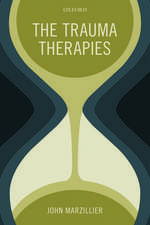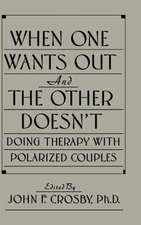Solutions for the Treatment Resistant Addicted Client: Therapeutic Techniques for Engaging Challenging Clients
Autor Nicholas A. Roesen Limba Engleză Paperback – 10 dec 2001
This useful volume, the result of more than ten years of work in researching and refining the techniques most likely to lead to positive client outcomes, offers field-tested methods for dealing with the most challenging addicted client types. These include hopeless clients, clients considered to be in denial, and those who are in treatment not because they desire it, but because of a mandate from an outside authority. The techniques you'll find in Solutions for the “Treatment-Resistant” Addicted Client have proven to be successful with even the most difficult clients.
The techniques you will learn in this book avoid generating resistance on the part of the client and are easily integrated into any treatment model. You'll also find case studies, practice worksheets, and suggestions for therapeutic tasks to assign to your clients.
Solutions for the “Treatment-Resistant” Addicted Client will teach you:
- why treating even the most challenging clients with respect is vital to successful therapy
- why the concept of the client's “treatment readiness” is a myth; it is you, the therapist, who must be “ready” for the most challenging client!
- how to give your therapeutic message greater impact and break out of unproductive patterns of relating to your clients
And the book's final section, presented in Q&A format, addresses: - practical applications of the techniques discussed
- theoretical frameworks for the interventions suggested
- ethical concerns relating to dealing with clients who don't want treatment
Alcohol and drug counselors, probation/parole officers, social workers, and other mental health professionals who work with addicted clients will find this book an invaluable aid in their work. Students preparing to enter these careers, as well as those preparing for certification as alcohol or drug abuse counselors, also need the information found here. Solutions for the “Treatment-Resistant” Addicted Client is must reading for anyone dealing with this extraordinarily difficult population.
Preț: 149.40 lei
Preț vechi: 191.36 lei
-22% Nou
Puncte Express: 224
Preț estimativ în valută:
28.59€ • 31.05$ • 24.02£
28.59€ • 31.05$ • 24.02£
Carte tipărită la comandă
Livrare economică 22 aprilie-06 mai
Preluare comenzi: 021 569.72.76
Specificații
ISBN-13: 9780789011213
ISBN-10: 0789011212
Pagini: 186
Dimensiuni: 152 x 212 x 13 mm
Greutate: 0.29 kg
Ediția:New.
Editura: Taylor & Francis
Colecția Routledge
Locul publicării:Oxford, United Kingdom
ISBN-10: 0789011212
Pagini: 186
Dimensiuni: 152 x 212 x 13 mm
Greutate: 0.29 kg
Ediția:New.
Editura: Taylor & Francis
Colecția Routledge
Locul publicării:Oxford, United Kingdom
Public țintă
Professional Practice & DevelopmentCuprins
Contents
- Introduction
- SECTION I: MEETING THE CHALLENGE OF HOPELESS CLIENTS
- Chapter 1. Hope-Inspiring Reflections
- Five Types of Hope-Inspiring Reflections
- Hope-Inspiring Reflections: Practice and Responses
- Chapter 2. Scaling
- Case Study: Workplace Wallflower
- Additional Uses for the Scaling Technique
- Case Study: Tipping the Scales
- Chapter 3. Normalizing and Reframing
- Nonproblems
- Case Study: To Err Is Human
- Normalizing Techniques
- Reframing Client Problems: Practice and Responses
- Case Study: Progress in Disguise
- Chapter 4. Exploring Exceptions
- Case Study: “Exceptional Day”
- Techniques for Exploring Exceptions
- Additional Questions and Requests for Use in Exploring Exceptions
- Chapter 5. Externalizing Problems
- Turning Adjectives into Nouns
- Externalizing by Turning Adjectives into Nouns Practice and Responses
- Chapter 6. Looking Toward the Future and Clarifying Goals
- Case Study: The Miracle Question
- Chapter 7. Sharing Counseling Notes with Hopeless Clients
- Chapter 8. Homework
- Case Study: Stop Smoking Group Homework
- SECTION II: MEETING THE CHALLENGE OF CLIENTS “IN DENIAL”
- Chapter 9. Listening, Alternate Definitions of Denial, and Preferred Views
- Listening
- Alternate Definitions of Denial
- Preferred Views
- Case Study: Unrealistic Optimism
- Chapter 10. Consciousness Raising
- Developing Discrepancy
- Examples of Mystery Questions
- Case Study: Backstabbers
- Decisional Balance Sheets
- Case Study: Decisional Balance Sheets
- Chapter 11. Clarifying Goals and Looking Toward the Future with Clients “in Denial”
- Turning Complaints into Treatment Goals
- Turning Client Complaints into Treatment Goals: Practice and Responses
- Chapter 12. Other Techniques
- Externalizing with Clients “in Denial”
- Case Study: The Beast Within
- Sharing Counseling Notes with Clients “in Denial”
- SECTION III: MEETING THE CHALLENGE OF MANDATED CLIENTS
- Chapter 13. Clarifying Your Role
- Differentiating Yourself from the Referral Source
- Questions for Mandated Clients
- Questions for the Mandated Client's Referring Agency
- Chapter 14. Preferred Views and Compliments
- Preferred Views of Mandated Clients
- Complimenting the Mandated Client
- Chapter 15. Identifying and Amplifying Change
- Identifying and Amplifying Pretreatment Change
- Identifying and Amplifying Between-Sessions Change
- Chapter 16. Turning Complaints into Treatment Goals and Promises into Treatment Tasks
- Turning Complaints into Treatment Goals
- Turning Mandated Client Complaints into Treatment Goals: Practice and Responses
- Turning Promises into Treatment Tasks
- Chapter 17. Other Techniques for Mandated Clients
- Scaling with Mandated Clients
- Reframing with Mandated Clients
- Exploring Exceptions with Mandated Clients
- Case Study: “I Could If I Wanted To”
- Developing Discrepancy with Mandated Clients
- Examples of Mystery Questions for Mandated Clients
- Case Study: “I Can't Believe It's Not Butter”
- Sharing Counseling Notes with Mandated Clients
- Homework for Mandated Clients
- SECTION IV: BREAKING YOUR OWN RULES
- Chapter 18. Utilization
- Case Study: “She Ruined My Life”
- Chapter 19. Paradoxical Interventions
- Advocating for the “No Problem” Point of View
- Symptom Prescription
- Case Study: Le
Descriere
This useful volume offers field-tested techniques for dealing with the most challenging types of addicted clients: hopeless clients, clients considered to be in denial, and those who are in treatment not because they desire it, but because of a mandate from an outside authority. The techniques you will learn in this book avoid generating resistance on the part of the client and are easily integrated into any treatment model. You'll also find case studies, practice worksheets, and suggestions for therapeutic tasks to assign to your clients.
Visit the author's website at www.newhopemanor.org.
To view an excerpt online, find the book in our QuickSearch catalog at www.HaworthPress.com.
Visit the author's website at www.newhopemanor.org.
To view an excerpt online, find the book in our QuickSearch catalog at www.HaworthPress.com.















